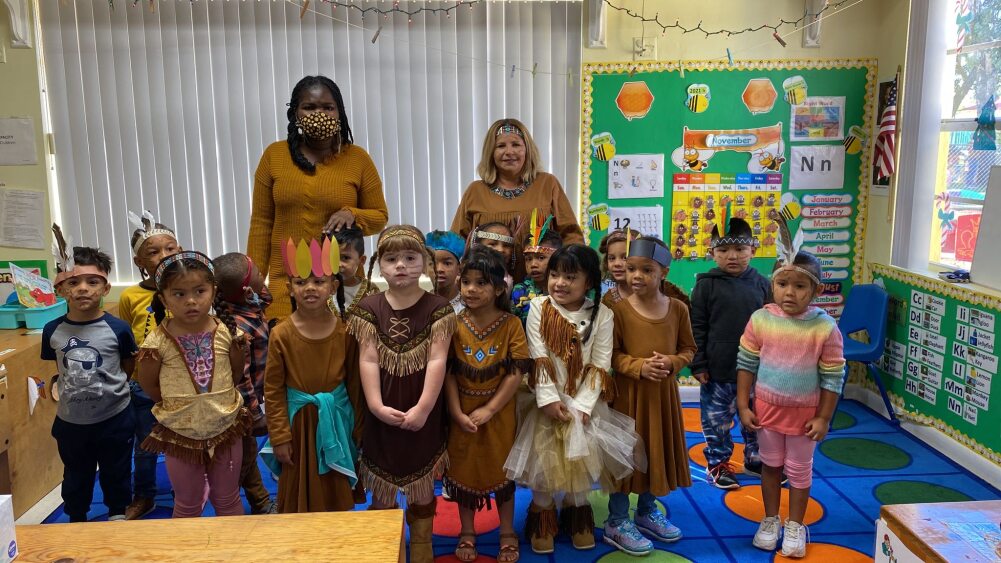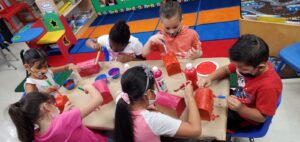The first years of a child are essential for their physical and emotional development. All the experiences that kids have in their early years are wonderful first encounters with the world that surrounds them, and those experiences will give them tools to become skillful humans and face all types of life situations.
Socialization is one of the most important things for child development. Babies start interacting with other humans from the moment they are born and will continue to do it for the rest of their lives. By interacting with other kids and grown-ups, kids grow their communication skills, learn how to recognize emotions in themselves and others, practice social norms, and much more.
At CLE, lake worth preschool, we believe that being sociable and making friends make us great humans. Here we will explore all the benefits of early childhood socialization and give you some advice on how to introduce it and improve it on toddlers and preschoolers.
Why should parents encourage early childhood socialization?
In a way, socialization is interacting with other people, but being sociable means more than sharing the same space with somebody else or just talking. It involves identifying emotions and sharing the own ones, understanding the other person, and even recognizing whether a situation is or isn’t safe, and knowing how to act in each case.
By promoting early childhood interaction, kids develop their emotional intelligence and skills to have healthy relationships with family, friends, and other adults around them. These are other socialization benefits for kids:
Communication skills
Communication skills are essential for your kid to interact with others. Children start learning how to communicate by watching how the members of their families interact with each other during different situations, like happy moments or disagreements.
Later, they will put those skills into practice in environments outside their homes, like preschools, playgrounds, or any other place where they have the opportunity to express their feelings, say what they like or don’t, and listen to others.
It is important to know that communication isn’t only about talking. Children can communicate using their body language, hand gestures and so much more.
Understanding diversity
Proper social environments for children allow them to interact with kids from other backgrounds and cultures. This will enhance their vision of the world and teach them to appreciate the diversity that surrounds them. Appcentance and tolerance are great values for every human to have.
Confidence and self-expression
Encouraging socialization from an early age helps kids grow their confidence. They learn how to act in new situations, which makes it less stressful for them and builds their self-esteem to feel comfortable sharing who they are around new people.
Social-emotional development in early childhood is crucial for the well-being of your kid. Studies have proven that the lack of social interaction is one of the main reasons behind social anxiety in toddlers. We want our kids to be happy, confident, and take good risks, like talking to other kids on the first day of school, playing a new sport, and more.
Empathy
Developing empathy is one of the most important benefits of early childhood socialization. Interacting with others not only will teach kids how to listen and express their ideas, but it will also help them recognize emotions in others and themselves, and care about them.
It is essential to teach with example to help others who are in need and stand up against injustice. These qualities will give your child the skills to face confrontation, be resilient, be communicative, and be more comfortable in new places or situations.
Making friends
Allowing kids to socialize with others early will help them build strong relationships with other kids. Friendship is one of the greatest things in life, and during childhood, it is fundamental to improve communication, language abilities, imagination, and so much more for their physical and emotional well-being.
Your kids’ friends will be a significant part of their lives, they will be there for the fun and good times, to give love and support, to make great memories, and to make them feel part of a family outside their real family.
How to introduce and improve socialization to your kid?
Even though socialization happens naturally, there are many ways for parents to encourage it. Here are some children’s socialization tips for parents to consider:
Involve them in group activities
Socialization starts when children interact with others, so involving our kids in group activities is a great way to stimulate it.
Going to the park or visiting playgrounds so your kid play with others are good ideas, but you can take it to the next level by taking your kid to group activities where they can hang around the same children and adults, so they can start to create relationships that last more than just a day.
Activities like VPK or preschool, sports, playdates, all types of group classes or even having a group to go to the park are great options to develop social skills for preschoolers and toddlers.
Explore their interests
Kids express themselves more freely when they are in places or situations that make them feel happy. Pay attention to your child’s interests and find activities that not only stimulate them but allow them to know other kids with similar tastes.
This will be an open door for your child to make friends, explore the things that they like, and learn in the best way.
Teach them with example
As we mentioned before, kids start learning how to socialize by watching what parents and family do, so it is essential to give them a good example. Be kind, tolerant, and empathic towards others so your kid can learn how to act in similar situations.
Take your kid to social gatherings with family or friends, adults or children, so they can learn social norms by seeing and practicing them. Be patient if your kid doesn’t behave as you want, remember, they are learning.
And celebrate socialization milestones in early childhood, from first words, first playdate, first attendance to a group event, first day of school, and many other firsts.
Express interest in their friendships
As we encourage children to make new friends, parents need to show interest in those new relationships. Asking your kid about their friends, and how they are doing or inviting them on playdates are great ways to show that you care about their friendships and also allow your kid to express how they feel.
Encouraging your children to be sociable is an effort that takes time and patience, but gives great benefits that will last for the rest of your kid’s life. At CLE, one of our main goals is to incentivize our little students to socialize in a safe environment where they can develop all those good skills and many others to become kind, empathic, and resourceful adults.




